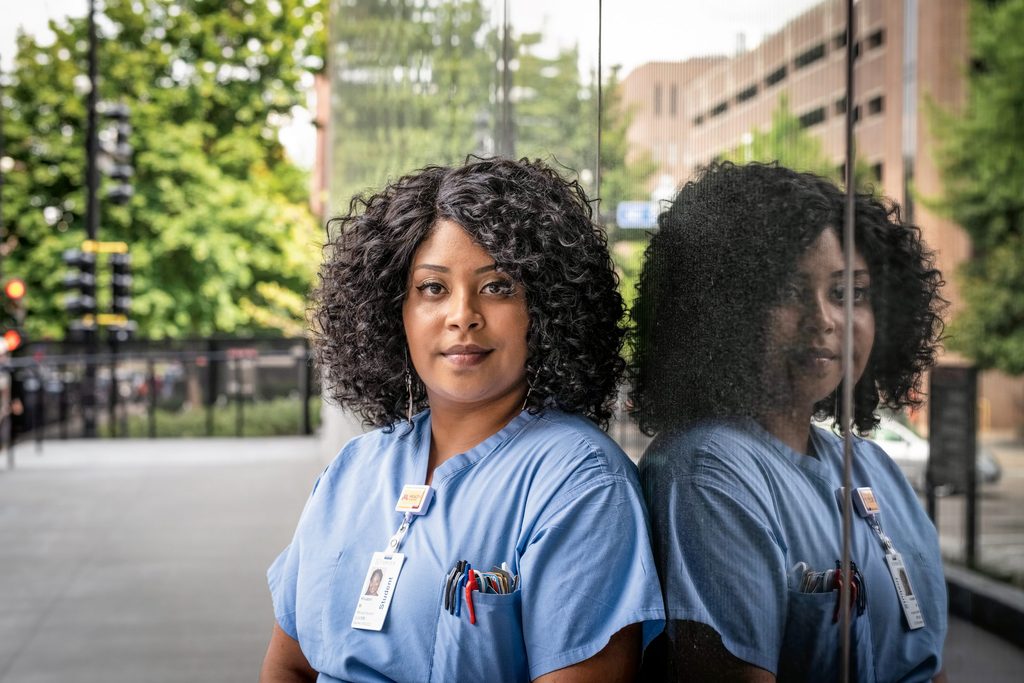Medical student Khuaten Maaneb de Macedo ’16, who helped treat injured protestors in the wake of George Floyd’s murder, is a tireless advocate for racial equity in the health care system.

It was May 28, 2020. Scrolling through Facebook, Khuaten Maaneb de Macedo ’16 came upon a long list of medical supplies needed to treat demonstrators protesting the death of George Floyd at the hands of Minneapolis police officer Derek Chauvin. De Macedo, a third-year medical student at the University of Minnesota, ransacked her house for what she could find and headed to Walgreen’s for more; then on to Holy Trinity Church in south Minneapolis, where mountains of supplies were being stockpiled. At the church, she identified herself as a med student and was immediately sent to help staff an aid station near the Minneapolis Police Department’s Third Precinct headquarters, where protesters were gathering.
As the protest built into a violent night, during which the police station and nearby buildings were torched and people were injured by rubber bullets and tear gas, de Macedo got to work — first at the aid station and later back at Holy Trinity. The next night, she served at Epworth Church, where a makeshift hospital had been set up.
In the months since, de Macedo’s been a tireless advocate for BIPOC folks and allies advocating for social justice and for racial equity in the health care system. This commitment earned her a 2021 In the Spirit of Carleton award, which is given to recent alumni who “show initiative, creativity, purposefulness, and a commitment to quality and improving their community.”
Yet de Macedo remains modest. “It was my third year [of medical school], so I was fresh from book studies,” she says. “I could help with small things, like scrapes and cuts, but the medics who were more trained went out for the more serious things,” including a stabbing and a dislocated arm.
Then, as the protest escalated, police brought out the tear gas. “We packed up as many supplies as we could, pretty much in a panic, and went back to Holy Trinity. You could see fires burning and people were running toward us. We were trying to help as much as we could, flushing out their eyes, helping them calm down,” recalls de Macedo. One woman who had been gassed was struggling to breathe. “Her hijab was coming off and she was panicking. I sat with her, calming her, breathing with her, and helping her feel more grounded.”
It was an act that, as de Macedo finishes a year of clinical rotations and begins applying for surgical residencies, sums up what she views as a calling. “Things as simple as sitting with that woman, end up being what health care is all about,” she says. “And that’s how I want my care to be for the rest of my career: sitting an extra two minutes with a patient, even though I’m running behind.”
The oldest of four siblings, de Macedo learned to love the medical profession when her mother was hospitalized after the premature birth of one of her sisters. The skill and kindness of the hospital staff, says the Madison, Wisconsin, native, made a permanent impression. “And then there was our primary care provider,” she recalls. “My mom would come to an appointment worried and leave happier. I wanted to be able to do that for people, too.”
De Macedo is also dedicated to health care equity, which for her means that all patients get the best care, especially BIPOC patients, who have often been denied it; or worse, have become victims of cruel medical initiatives like the Tuskegee Syphilis Study (1932–1972), in which Black men with the disease were observed rather than treated. Additionally, she wants to help ensure that more BIPOC individuals enter the medical field and are given the tools and support to excel.
In June 2020 de Macedo helped organize a rally at the state capitol that, as she put it, “was about wanting health care providers to be more active in speaking out against racial inequity, because we, as a field, have a pretty sordid history.” Today she’s working with an outside consulting firm to help make the University of Minnesota Medical School’s website more welcoming and useful to BIPOC applicants. She also mentors BIPOC med students and works with Mask Up North Minneapolis, which distributes PPEs to a community hard hit by the pandemic.
“It’s about having health care that’s equitable for everyone and treating each patient with the same amount of respect and care,” de Macedo says when she is asked to sum up her personal mission. “It was really powerful to be a part of that capitol rally, to see the outpouring of support from the community that day. But what long-term changes are we going to go for? That’s what I want to know, and that’s where my commitment is.”
